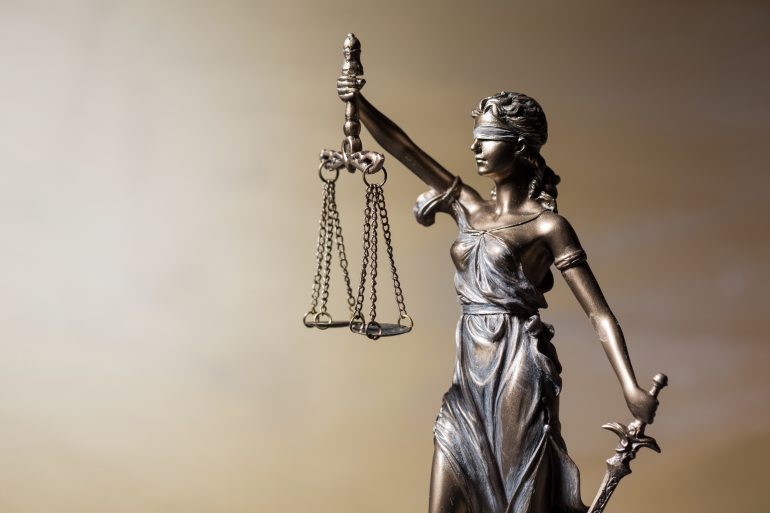What is justice?
Most definitions of justice are circular. Merriam-Webster Dictionary defines it as, “the quality of being just, impartial, or fair.” When you try to figure out what it means to be just, impartial or fair, you get more ambiguous answers. For example, just is defined as “acting or being in conformity with what is considered morally upright.”
While I’m only mentioning one of many definitions of just and justice, the same problem plagues all basic definitions. They fail to outline what it would mean to be morally upright or fair. They simply describe the need for it.
So what is justice?
What does it mean to act morally or to treat people fairly? How do you even start to determine such a thing?
In a time where people throw around the word “justice” like it’s candy at an Aufruf, it’s important for people to know what they’re talking about. Things like “social justice,” “students for justice,” “justice for women,” and “justice for African-Americans” are said constantly, without any concern for the meaning of what is being said.
John Rawls, an American moral and political philosopher from the 20th century, posited an interesting thought experiment that I believe encompasses the true definition of justice.
Rawls invited people to stand behind a “veil of ignorance” to determine what they believe a just society would look like.
In the Veil of Ignorance thought experiment, people were asked to make decisions that would govern an ideal world with no knowledge of where they would stand in it. That means they would be asked to make decisions without knowledge of their sex, race, physical handicaps, generation, social class of parents, etc.
The people would still be self-interested rational human beings who are fully aware of:
(1) the general types of possible situations humans encounter such as division of resources.
(2) general facts about human psychology and “human nature” such as pride and self-interest.
It follows that since they would not know if they would be handicapped, rich, attractive or anything in between, any rational person would avoid adopting discriminatory practices.
A person unaware of their social standing would likely adopt principles of universalized healthcare and someone unaware of which generation they would fall into would allocate equal resources to all.
Rawls draws a variety of conclusions from this experiment. Including but not limited to, equal basic rights, equality of opportunity, and promoting the interests of the least advantaged members of society.
However, when considering the fact that – practically speaking – we can’t overhaul the moral code of the entire world, nor is everyone capable of the same thing in a world where opportunities to flourish are abundant, the most important takeaway is that a just society is one in which you wouldn’t dread being born into a different family for any reason other than you might miss your mom’s cooking.
A just society is one in which every single person has equal access to life, liberty and the pursuit of happiness. I’m not going to argue that a just society is one where everyone has a nice house, 2.5 kids, a dog, two cars and three gourmet meals a day because justice looks different in every corner of the world.
However, the overarching theme of a just society is that no one should ever look at someone and think, “I’m so happy I’m not them,” solely based on their sex, race, religion etc.
That doesn’t mean jealousy doesn’t exist. Some parents are nicer, some families have different cultures and experiences in the world and there are many discrepancies that might still exist. Some people are born more intelligent, resilient, attractive or athletic than others. That inherently leaves room for large discrepancies in opportunity. For example, an open modeling call is really only open to those pretty enough to compete.
Despite this, I think a just world is one in which every person has the chance to pursue the things that interest them, whether or not they stand a chance at success. Alternatively, it would be unjust to compel the Dodgers to take on a mediocre player “just to give him an equal chance.” Instead, everyone should have a chance to audition, and if an amateur player beats Stanford’s best athlete so be it.
A just society is one that doesn’t limit people based on birth but also allows people to retain choice in who they work with or hire, particularly in specialized fields.
A just world would be one in which no one pities another person’s skin color. Where being Jewish, Muslim, Buddhist and Hindu are simply descriptions, not hindrances.
To me, justice doesn’t mean socialism or any other form of forced equality. One of the biggest beauties of the human race is our extremely diverse range of talents, passions, abilities and experiences. Justice means fair opportunity, which simply means treating other people as you would want to be treated if you had no idea what family you would be born to. Ultimately, justice means not thinking, “Well, that’s not my problem, so why should I care?”
A just society is one in which you do unto others as you would want done to you. As Jews have been saying for centuries V’ahavta Lereacha Kamocha – love your friend as you love yourself.

